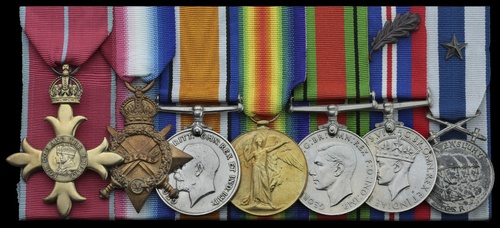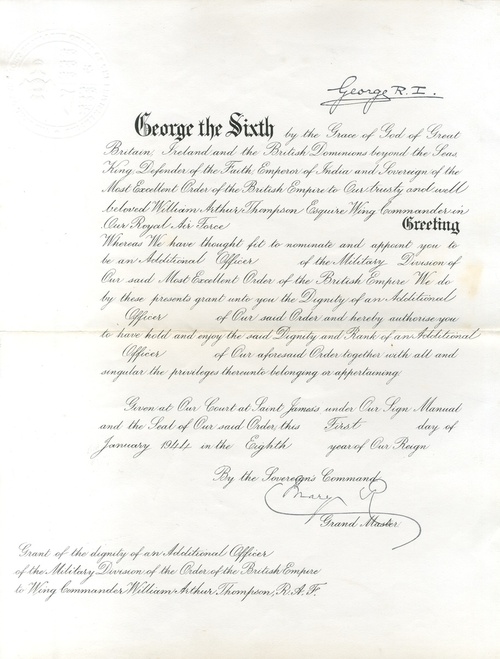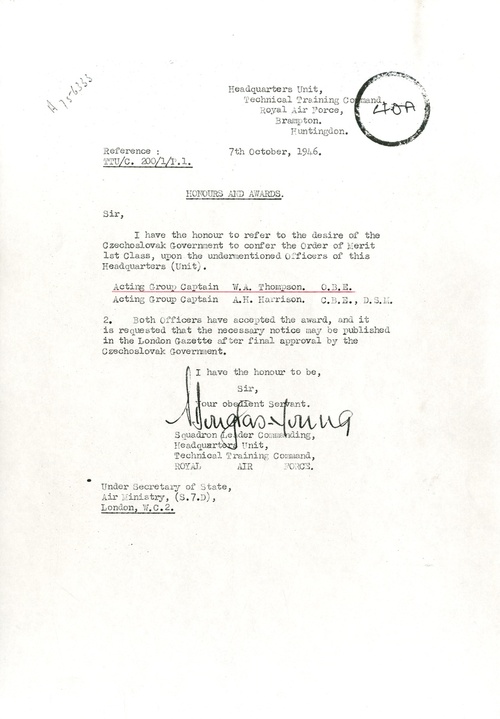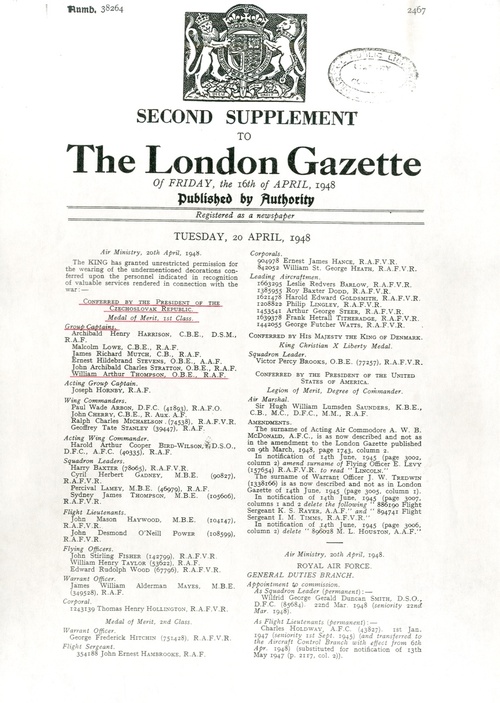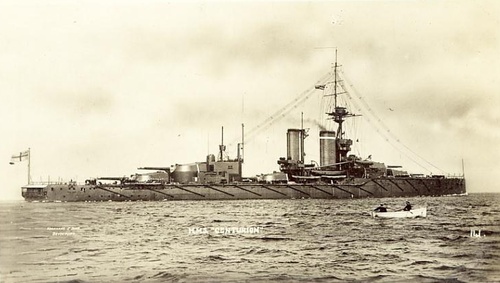Auction: 22003 - Orders, Decorations and Medals
Lot: 429
The rare and exceptional O.B.E., Czech Order of Military Merit Medal group of Seven awarded to Group Captain W. A. Thompson, Royal Air Force, late Yeoman of Signals, Royal Navy, who saw action at Jutland as Yeoman of Signals aboard Centurion before transferring to the Royal Naval Air Service
Commissioned with the newly-formed Fleet Air Arm, Thompson was instrumental in training the officers and men of the Royal Air Force during the Second World War with his contribution noted by both British and Czechoslovakian Governments
The Most Excellent Order of the British Empire, 2nd Type, Military Division (O.B.E.), Officer's breast Badge, silver-gilt; 1914-15 Star (232064 W. A. Thompson. Y.S. R.N.); British War and Victory Medals (Lieutenant. W. A. Thompson. R.A.F.); Defence and War Medals 1939-45, with M.I.D. Oak Leaf; Czechoslovakia, Republic, Order of Military Merit, 1st Class Medal, pitting overall and minor contact wear to Great War awards, overall very fine (7)
O.B.E. London Gazette 1 January 1944.
Medal of Merit London Gazette 20 April 1948.
William Arthur Thompson was born at Studland Bay, Swanage, Dorset on 16 March 1889, the son of a Chief Officer in the Coastguard. Joining the Royal Naval Hospital School he was posted to H.M.S. Hercules on 15 September 1904 as Signal Boy. His first posting afloat was with the battleship H.M.S. Bulwark on 21 February 1905.
H.M.S. Hazard
Achieving his majority aboard H.M.S. Edward VII on 16 March 1907 he was promoted to the rank of Signalman. Serving as Leading Signalman aboard H.M.S. Hazard- a Submarine Depot Ship- from 29 October 1911. He was still aboard this vessel when she collided with the submarine A3 on 2 February 1912, sinking her with all hands.
Jutland and afterwards
Stationed aboard King George V at the outbreak of the Great War Thompson was soon posted to H.M.S. Centurion on 13 February 1915 as Yeoman of Signals. He was still serving in this post during the Battle of Jutland on 31 May 1916 when Centurion was engaged with the battlecruiser Lutzow.
Posted to the seaplane tender H.M.S. Campania on 2 February 1917 he was discharged to Commission with the Royal Naval Air Service on 31 March 1917. After that he began to fly as an observer from Engadine and later Furious on anti-Zeppelin missions over the North Atlantic.
Inter-War
Posted to R.A.F. Gosport as a Flying Officer with No. 210 Squadron in September 1921, Thompson was later transferred to the Fleet Air Arm in 1922. He was promoted Flight Lieutenant the next year, winning the Dunning Cup in the process and continuing to improve his skills with courses in signals and wireless training.
Thompson was posted overseas on 9 December 1932, serving at the Signals Section at Headquarters Iraq Command before moving to No. 84 Squadron which was stationed in the country. Returning to Britain on 21 January 1935 he was commanding No.1 Electrical and Wireless School at Cranwell by the outbreak of the Second World War.
Second World War
Promoted Wing Commander in 1940 Thompson was appointed Chief Instructor of Signals and Wireless at Cranwell in 1941 received a mention (London Gazette 1 January 1941, refers). Remaining in his training role Thompson's brief was broadened to include training in the use of radar, he was recommended for an award on no less than five occasions with the final one being accepted. Thompson's report for 1944 states the following on his performance:
'this officer is employed on the air staff at command headquarters and is responsible for signals training. He has been mainly responsible for the successful technical control of a continuous flow of signals and radar trades into the service, with a constant peak of 450 officers and 23,900 trainees. At all times his unselfish devotion to his duties and personal example have proved worthy of the highest praise'
Retiring briefly in March 1944 Thompson was re-employed and posted to R.A.F. Wantage Hall as head of signals training.
Postwar and Reward
Thompson remained with that post until 6 January 1947. Retiring again he was promoted to the rank of Group Captain and awarded the Czechoslovakian Order of Military Merit, doubtless as a result of his training Czech airmen throughout the war. Due to the uncertain political situation in Eastern Europe at the time however, it took many years for the insignia to reach him. Thompson died at his son's home at Waterlooville, Hampshire; sold together with an original award document for the Order of the British Empire and newspaper obituary as well as copied research including service papers, London Gazette entries and medal rolls as well as correspondence, reports and recommendations for award.
Subject to 20% VAT on Buyer’s Premium. For more information please view Terms and Conditions for Buyers.
Sold for
£900
Starting price
£700

